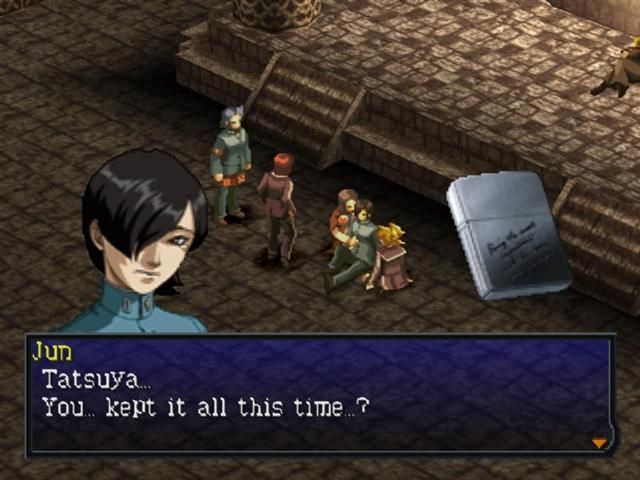I want to share an example that may be a bit weird because I'm guessing for a lot of people it probably isn't a sensitive topic, and actually the game it comes from, Persona 2: Innocent Sin, is all about dealing with touchy subjects and traumas the main cast deals with. Still, this is a standout for me because of the rarity of the subject being tackled at all in games and the tactful way the game handles it.
This is Eikichi Mishina
He goes to a different school but is friends with the protagonist. He's extremely self-centered, narcisistic, never seems to take anything seriously and seems to believe all girls are behind him. He's obviously the main source of comic relief in the game because of all this.
Eikichi is an odd one because while the game likes its humor, most characters are complex and have different layers to their personalities... But Eikichi remains pretty ridiculous for the most part. Sure he's very likeable and dependable, but it's rare to see him being 100% genuine about his feelings or thoughts.
Anyway, this is Miyabi
She's a girl from the protagonist's school. She is secretly in love with Eikichi (secretly as in everyone knows except him), but for some reason doesn't want him to know her name and seems to try to avoid him in general... Suspicious because Eikichi is looking for a girl named Miyabi from the same school as well. They run into each other a couple of times through the story, and at one point he even saves her from danger, but doesn't seem too interested in her in general despite the villains using her as bait for him at one point, for some reason.
Now, Eikichi is pretty weird in general, but everything starts to make more sense once some flashbacks occur and we see what the main cast looked like as kids, and Eikichi is by far the most surprising
Young Eikichi is shy, he stutters, and in general has a sort of deffensive attitude that seems to imply he's bullied. But above all, what sticks out the most is that
young Eikichi is fat. And one thing suddenly becomes obvious, Eikichi seems to have built an entire persona around his childhood traumas and insecurities (which makes sense, because according to Freud this is how much of our personalities work). He was once a fat, shy and insecure kid and now he's fit, outgoing and won't shut up about how attractive and great he is.
Now this alone isn't that impressive, but as the story unfolds, we find out that Eikichi acts like this to hide his insecurities and fears, but also to get people to like him, which again makes a lot of sense, but eventually he finds out MIyabi's name, and reveals that he was his childhood crush and that she rejected him back when the day because he was fat, and she was very explicit about it. Miyabi at one point fell in love with Eikichi but found herself in an ironic situation because now the roles were inverted, Eikichi is now a "normal" guy who seems comfortable with his appeareance while she's fat, so she fears that he'll mock her and hate her if he ever find out she's the same Miyabi from his childhood...
The context for this reveal is that Eikichi is facing his shadow, who starts revealing Eikichi's hidden insecurities and brings up what happened between the two back then. And I think any other game could use this setup to show Miyabi what karma is and teach her a lesson
But Eikichi is nothing like that, and he reacts in a completely unexpected way. He desperatedly wanted to see Miyabi again now that he's changed, but he doesn't care that Miyabi looks different now, he's even baffled that she thought he would care, but he could never because he knows what it is to be like that. He accepts her for who she is, Miyabi apologizes and everything ends in a happy note... more or less.
But yeah, I believe this is the one and only example of "fat acceptance" that I've seen in games. The subject is rarely touched in media in general, so it really surprised me back when I played this, and I think it was very respectfully and makes Eikichi one lovable goof. He's my favorite character in all of Persona.






